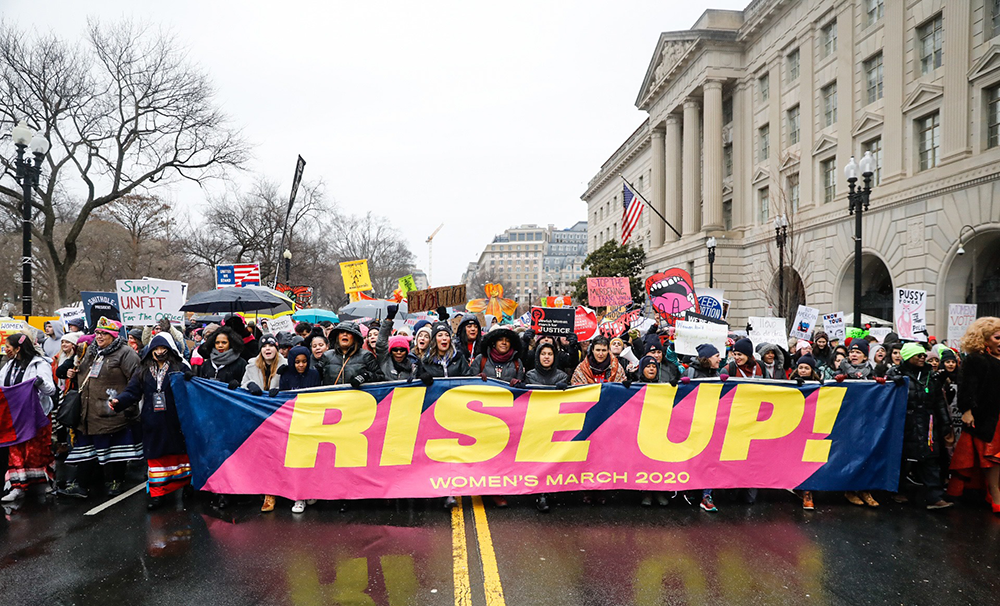The fourth annual Women’s March on Washington drew a crowd of around 10,000 people Saturday, approximately a sixth of the estimated 65,000 people who attended last year’s march.
Several Georgetown University students attended the march in downtown Washington, D.C., on Jan. 18. This year’s march marked the 100th anniversary of the 19th Amendment, which gave women the right to vote in the United States.
While the first Women’s March in 2017 drew an estimated 500,000 protestors, the past three years have failed to reach the same level of participation.

One possible explanation is that the march has become increasingly partisan. Attendees and speakers at the march often openly oppose President Donald Trump’s rhetoric and policies, discouraging more conservative women from attending, according to Sophie Bennett (COL ’23), who attended both this year’s march and the march in 2017.
“I think partially it’s because the message has become more anti-Trump,” Bennett said. “That can be isolating even for women who identify as Democrats who are maybe more centrist or fear that not being centrist about the way you approach feminism isolates right-wing voters and Americans.”
The Women’s March has also faced controversy in the past because of claims of antisemitism within the movement, which may also be a factor behind the decline in participation. The march was accused of promoting antisemitic rhetoric last year when Co-President Tamika Mallory refused to apologize after posting a photo of her alongside Louis Farrakhan, the leader of the black nationalist group Nation of Islam, who referred to Jews as “satanic” in a 2018 speech.
Despite the claims of antisemitic rhetoric surrounding the march, many students still chose to attend to demonstrate their dedication to women’s rights and equality, according to Bennett.
“Being a feminist has always been a part of my identity and it’s something that’s evolved over the past few years of my life,” Bennett said. “There are still plenty of women that recognize that the current administration is bad for women and dangerous for people of all gender identities and sexual orientations.”
The march also took place just three days after what would have been the 91st birthday of Martin Luther King Jr., as pointed out by humanitarian and activist Arndrea Waters King, who spoke at the event.
The dream that King fought for over half a century ago has been revived in the modern fight for gender equality, according to Waters King, who is the wife of Martin Luther King III.
“It’s ironic that America now more than ever is challenged to realize its dream by fulfilling the dream of Martin Luther King Jr. and Coretta Scott King,” Waters King said at the march. “In their spirit, we can and we must work to seize the urgency of the moment, for the only way to keep from moving backwards is to keep moving forward.”
The march began around 11 a.m., with speakers rallying up the crowd before marching toward the White House.
Protesters marched to the White House, where they chanted “Un Violador en Tu Camino,” a feminist protest anthem that denounces patriarchial norms, rape culture and violence against women. The protestors pumped their fists into the air as they chanted, led by Las Tesis, a Chilean feminist collective.
Despite the freezing temperatures and snow, partaking in the march this year was an empowering and patriotic experience, according to Maria Howard (SFS ’23), who attended the march.
“I was very cold, but it was also very empowering and it was cool to see that there were so many people that were fighting for the same thing,” Howard said. “It made me appreciate being an American more because we have the opportunity to voice our opinions and petition and practice our rights.”
This year’s march begins the decade with renewed hope for achieving greater respect and equality for all, Arndrea Waters King said.
“This can be the decade that ushers in a new freedom, new responsibility for each other, and new dignity of human behavior,” Arndrea Waters King said. “Today I call for you to remember the power that resides with and within each of us, to remember the power that we can embrace the vision that another world is possible.”




















